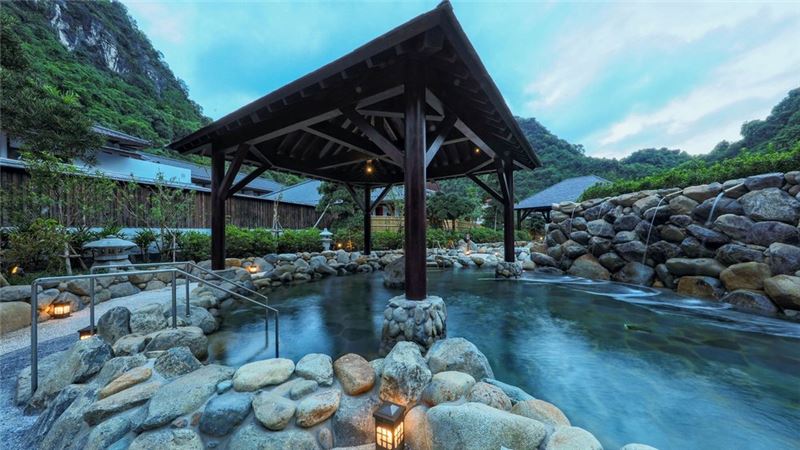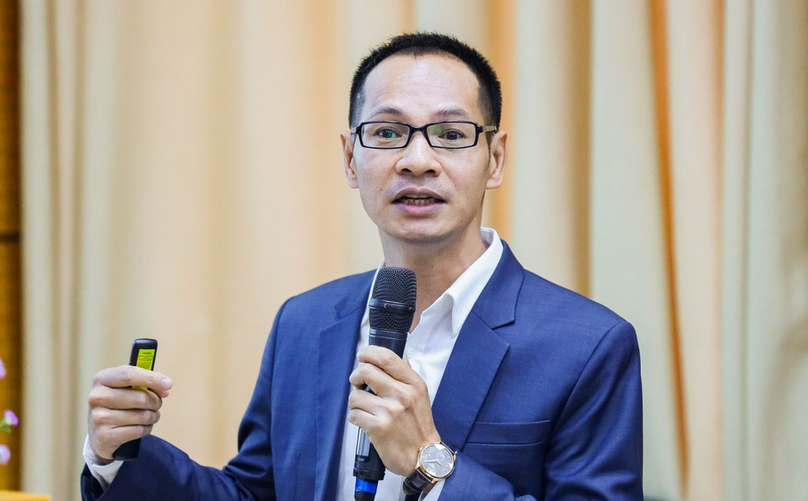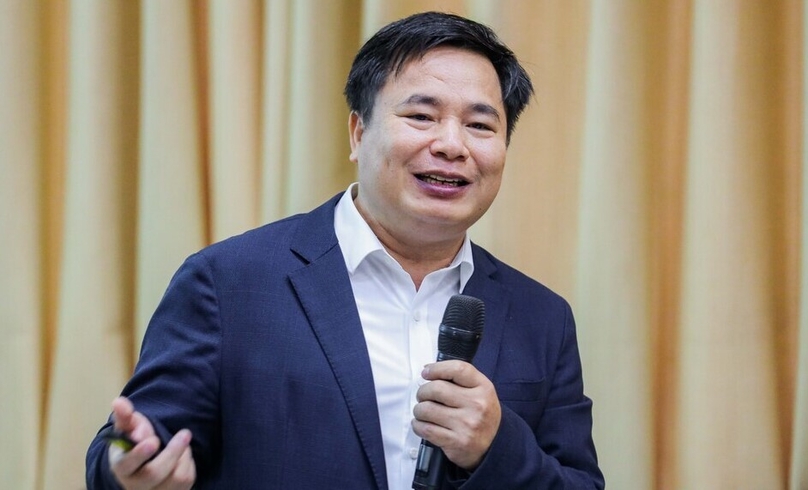Vietnam a rising destination for wellness-based real estate investments
Vietnam, already home to a robust tourism industry, is predicted to become a rising destination for wellness-based real estate development given its natural beauty, abundance of mineral springs, and diversity of traditional medicine and herbs.

A corner of Quang Hanh Onsen Resort in Quang Ninh province, northern Vietnam. Photo courtesy of iVIVU.
Land for wellness-based real estate
Global Wellness Institute (GWI) evaluated the world’s wellness economy at about $4.4 trillion in 2020 and estimated it would reach $7 trillion by 2025.
Wellness tourism value alone reached $617 billion and $720 billion in 2017 and 2019, respectively. This is predicted to increase to $816.5 billion this year and exceed $1,127 billion in 2025, with a likely average growth of 20.9% per annum.

Real estate consultant Nguyen Hoang. Photo by The Invetor/Trong Hieu.
Vietnam fits easily into this global development trend. Real estate consultant Nguyen Hoang told Tuesday’s wellness-based real estate workshop held by The Investor in Hanoi that Vietnam is predicted to become a leading destination for wellness real estate.
"Vietnam possesses a long coastline of 3,200 kilometers, beaches considered among the world's most beautiful, subtropical climate, many hot mineral springs, a traditional medicine sector with herbal sources very suitable for health care, world heritages, historical relics, religious beliefs, and cultural diversity," Hoang explained.
"In addition to its natural potential, Vietnam’s middle and upper class are expanding fast, meaning more spending in the wellness sector."
Healthcare tourism is also expanding, Hoang said. "Vietnam regularly welcomes overseas Vietnamese back to the country for dental treatments, aesthetics, and traditional medicine therapy."
According to Nguyen Anh Tuan, director of the Institute of Tourism Development Research under the Vietnam National Administration of Tourism (VNAT), Vietnam is home to beautiful beaches that fits resort tourism from the north to the south like Tra Co, Ha Long, Do Son, Cat Ba, Sam Son, Cua Lo, Thien Cam, Lang Co, Nha Trang, Mui Ne, Vung Tau, and Phu Quoc.
"In addition, its coastal areas have 2,773 large and small islands, on which there are many small, quiet and peaceful beaches that are very suitable for healthcare and resort tourism," he noted at the event.
From the end of the 19th century to the beginning of the 20th century, French colonists built many resorts combined with healthcare initiatives like Sa Pa, Mau Son, Tam Dao, Bach Ma, Ba Na, and Da Lat.
These resorts are often at an altitude of over 1,000 meters above sea level and well known to domestic and international tourists.
"Vietnam has rich and diverse mineral water resources, valuable for medical, nursing and healthcare use," Tuan said.
The country's geology sector has discovered about 400 sources of hot mineral water across the country, of which 287 have been researched, analyzed and classified into 11 different types. They have therapeutic effects and can be exploited to make bottled drinking water," he added.

Nguyen Anh Tuan, director of the Institute of Tourism Development Research. Photo by The Investor/Trong Hieu.
Current wellness real estate landscape
Along with robust development of the national tourism industry, wellness real estate has seen many new developments across the country with a diversity of attractive products.
Wellness tourism on the basis of exploiting mineral water, hot water, and natural mud minerals is a significant part of the new development.
Many hot springs in Vietnam have been invested in and exploited by big investors like the Quang Hanh hot mineral spring area in Quang Ninh province - home to Ha Long Bay, invested by Sun Group; the Thanh Thuy in Phu Tho province, invested by Japan's YoKo Group following the Onsen model of Japan; and the under-construction My Lam hot mineral spring tourism complex in Tuyen Quang province.
Some tourist areas provide mud bath, spa, sauna, massage services like the Hundred Egg (Tram Trung) tourist area in Khanh Hoa province, the V-resort in Hoa Binh province, the Saigon-Binh Chau hot mineral resort in Vung Tau province.
A new type of spa with a treatment process that integrates health care education, exercise, dining, and treatment has just appeared in Vietnam. Spas located in resort hotels contribute a large market share to the development of the whole industry.
Vietnam currently has 38,000 tourist accommodation establishments with over 780,000 rooms, of which 90% have resumed normal operations after the Covid-19 pandemic.
There are a total of 561 four-five star tourist accommodation facilities, of which 180 resort hotels have implemented spa activities and health care programs for their guests, according to the tourism authority.
The exploitation of traditional medicine has begun to be of interest. The first product is Prof. Nguyen Tai Thu's acupuncture tourism program to improve health and cure, launched in 2006.
The Bao Long medical tourism area belonging to Bao Long Medical Group in Son Tay township, Hanoi is a combination of tourism and medical treatment, offering customers visits to its gardens of rare medicinal plants, drug making facilities, and drug supermarkets with thousands of oriental medicinal products.
There is also service called "weight loss tourism", suitable for the natural terrain of both mountains and the sea. Participating guests will be able to follow a diet at a resort, and be guided by the coach to do exercises, jogging on the beach, swimming, climbing mountains, having massages, mineral mud soaking, herbal medicine bathing or camping.
Policy recommendations
At the workshop, Hoang and other experts pointed out some main reasons why Vietnam has not been able to promote the sector’s development as expected. To date, the sector is still a new concept and as such, lacks clear definitions, development orientations, criteria and standards.
There is no overall policy orientation for land planning, investment incentives, registration and other procedures. Coordination between the tourism, healthcare, and sports sectors is also limited.
In general, limited capital has left several projects in this sector unfinished or operating inefficiently. The sector is also hampered by the lack of a strong, professional workforce. Meanwhile, marketing and promotion campaigns both within and outside the country for highlighting wellness-based lifestyle options are limited.
Hoang suggested six solutions for the sectoral picture.
The first is to design a policy to support its development in line with the national tourism development strategy for 2025 and 2030.
Secondly, Vietnam’s overall tourism development planning or national land use planning must include the use of land associated with tourism and the conservation of natural resources and the environment.
His third suggestion was to build a national network connecting professional areas like healthcare, sports, and experiences of domestic culture with overall tourism.
Next is to build a mechanism to help investors gain better access to capital sources. “For example, allowing foreigners to buy condotel products will mean not only more capital inflows but also lure more wellness tourism visitors to Vietnam,” Hoang said.
His fifth and sixth suggestions were to strengthen national management capacity in the sector and improve marketing and promotion efforts.
For the problem of limited capital sources, Can Van Luc, chief economist at BIDV bank, said Vietnamese laws do not allow foreigners to have land use rights, and a suitable approach to this is important.
"My point of view is to consider allowing foreigners to buy and own landed houses and other types of real estate in Vietnam, like resorts, so that there could be more capital for the economy. But this must ensure safety and assure the benefits of all parties."
Luc said investors in real estate, including wellness-based projects, should not rely much on banking loans, and that more should come from corporate bonds, private equity firms and investment funds. He also advised investors to pay close attention to urban development plans in localities and learn from other countries.
He also suggested the government allows foreigners to use resort and wellness real estate as collaterial to acquire loans for investments.
According to Nguyen Dinh Tho, director of the Institute of Strategy and Policy on Natural Resources and Environment, there is a lack of legal bases to develop resort and wellness real estate. There are also limitations in policies on immigration, immigration and visas.
"If we want to develop resort real estate, we need to open up in terms of policies. For example, the current Law on Construction allows foreigners to own apartments, but the Land Law does not allow them to own landed houses."
- Read More
Vietnam, Finland firms sign multiple MoUs on satellite, cybersecurity, aviation partnerships
A series of cooperation agreements were signed between Vietnam and Finland on Tuesday, within the framework of Party chief To Lam's official visit to Helsinki, while bilateral relationship was lifted to a "strategic partnership".
Economy - Wed, October 22, 2025 | 12:43 pm GMT+7
Trung Nam Ca Na seeks to convert agri-forest land for $147 mln industrial park in central Vietnam
Industrial park developer Trung Nam Ca Na is seeking approval to convert about 170 hectares of agricultural and forest land for the construction of a VND3,875 billion ($147 million) project in Vietnam’s central coastal province of Khanh Hoa.
Industrial real estate - Wed, October 22, 2025 | 10:54 am GMT+7
PV Power's arm posts 5-fold jump in Q3 profit on margin recovery
PetroVietnam Power Nhon Trach 2 JSC (HoSE: NT2) reported a sharp rebound in third-quarter earnings as improved margins and higher revenue lifted profits nearly fivefold from a year earlier.
Companies - Wed, October 22, 2025 | 8:37 am GMT+7
TCBS overtakes SSI to become Vietnam’s largest securities company by market cap
Over 2.3 billion shares of Techcom Securities JSC (TCBS) debuted on the Ho Chi Minh City Stock Exchange (HoSE) on Tuesday. The stock, TCX, recorded the highest price and the largest market capitalization in the Vietnamese securities sector.
Finance - Tue, October 21, 2025 | 10:27 pm GMT+7
Indonesia’s palm oil industry becomes investment magnet
Indonesia’s palm oil sector attracted IDR52.7 trillion, or approximately $3.2 billion, in investment during the first nine months of this year, with the money going into enabling the country to capture more value out of its top commodity, the country’s Ministry of Investment reported.
Southeast Asia - Tue, October 21, 2025 | 9:34 pm GMT+7
Indonesia reports strong job, investment growth
The Indonesian Coordinating Ministry for Economic Affairs reported strong job and investment growth during the first year of President Prabowo Subianto’s administration, compared with the first year under his predecessor.
Southeast Asia - Tue, October 21, 2025 | 9:29 pm GMT+7
Singapore grants conditional approval for 1GW low-carbon power import from Malaysia
Singapore has granted conditional approval to import 1 GW of low-carbon electricity from the Malaysian state of Sarawak, marking a new phase in the energy partnership between the two countries.
Southeast Asia - Tue, October 21, 2025 | 9:26 pm GMT+7
Margin lending in Vietnam’s stock market hits record, but not worrisome
Despite margin debt in Vietnam’s stock market surging sharply, experts believe that current margin pressure is not yet a major concern as top securities firms have significantly strengthened their capital buffers.
Finance - Tue, October 21, 2025 | 4:23 pm GMT+7
Lenders in Vietnam now in low-rate lending race: ACB exec
The biggest “headache” for banks in Vietnam now is that profit margins are getting thinner, said CEO of Asia Commercial Bank (ACB) Tu Tien Phat.
Banking & Finance - Tue, October 21, 2025 | 4:00 pm GMT+7
PV Gas - 35 years of innovation and technological leadership in Vietnam’s gas industry
Over the past 35 years of establishment and development (1990-2025), PV Gas, a subsidiary of state-owned giant Petrovietnam, has affirmed its pioneering position in Vietnam’s gas industry, marked by a series of groundbreaking achievements in science and technology.
Companies - Tue, October 21, 2025 | 3:45 pm GMT+7
Vietnam's consumer finance major F88 achieves 90% of year's profit target after 9 months
F88 Investment JSC (F88), a leading consumer finance company in Vietnam, reported a cumulative pre-tax profit of VND603 billion ($22.88 million) in the first nine months of 2025, a 2.5-fold increase year-on-year, reaching 90% of its full-year target of VND673 billion.
Companies - Tue, October 21, 2025 | 3:15 pm GMT+7
Vietnam corporate earnings to be driven by credit expansion, trading activity, property recovery
With Q3 earnings season underway, results are expected to come in broadly in line with expectations. Financials should remain the largest contributors, benefiting from credit expansion and trading activity, while real estate continues to recover as project launches and sales rates improve, writes Tung Dang, associate director at Dragon Capital.
Economy - Tue, October 21, 2025 | 2:33 pm GMT+7
Inland port opens in southern Vietnam province Tay Ninh, set to become border logistics hub
The 16.5-hectare Tan Cang-Moc Bai inland port in Tay Ninh province, southern Vietnam has been opened, offering logistics services and handling customs clearance for imports and exports.
Infrastructure - Tue, October 21, 2025 | 12:03 pm GMT+7
State-managed property trading centers will help curb speculation, price manipulation: expert
Establishment of state-managed real estate trading centers is expected to create a transparent transaction channel, helping control and limit speculation and price manipulation in the Vietnamese market.
Real Estate - Tue, October 21, 2025 | 8:37 am GMT+7
Vietnam's benchmark VN-Index records sharpest drop in 25-year history
VN-Index, which represents the Ho Chi Minh Stock Exchange (HoSE), saw the sharpest decline in its 25-year history on Monday, down by 94.76 points, or 5.47%, to 1,636.43.
Finance - Mon, October 20, 2025 | 5:49 pm GMT+7
Construction contractor Coteccons sets record FY2026 targets, capital base hike via share issue
Coteccons Construction JSC (HoSE: CTD), one of Vietnam’s largest construction contractors, has set ambitious targets for its fiscal year 2026, driven by a record order backlog and its push into international markets.
Companies - Mon, October 20, 2025 | 4:50 pm GMT+7

























